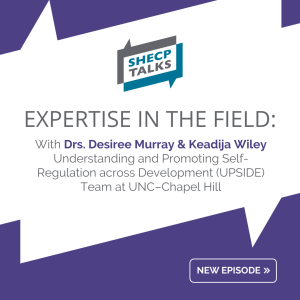
Tuesday May 21, 2024
Expertise in the Field – The UPSIDE Team at UNC-Chapel Hill
On this episode of SHECP Talks, we continue to reflect on the links between resilience and childhood poverty. Jen was delighted to welcome Dr. Desiree Murray and Dr. Keadija Wiley to talk about the work of the UPSIDE Team at UNC-Chapel Hill and, specifically, their Be Calm Program.
The Understanding and Promoting Self-regulation Intervention across Development (UPSIDE) Team, focuses on self-regulation interventions that promote resilience for children and youth. They discuss the window of opportunity present during early adolescence to teach social-emotional skills that students use throughout their lives. Dr. Murray says that “self-regulation is about being able to manage your thoughts and feelings in a way that helps you regulate your feelings and supports social behavior and supports solving problems and achieving goals.”
The Be CALM Program is a research-based program seeking to teach educators and early adolescent students skills and strategies for lifelong social-emotional health and well-being. Dr. Murray and Dr. Wiley discuss the impact that their program can have. Research shows that an increase in stress cortisol levels in educators reflects in the stress cortisol levels of their students. “Especially for students with marginalized identities, being at school and being marginalized or discriminated against creates tremendous amounts of stress, which is then going to interfere or make it harder to listen and to learn skills or to feel like those skills are even relevant to you” Dr. Murray says. The Be CALM program seeks to help reduce these levels through mindfulness practices and support, not just for students but for educators as well.
Dr. Murray and Dr. Wiley discuss the multidisciplinary approach they take, utilizing cognitive as well as emotional learning to achieve their goals. Finally they discuss how, although the Be Calm program was originally designed for rural communities, there are applications for it in urban environments.
No comments yet. Be the first to say something!